 | | | June is a big month for oceans, featuring National Ocean Month in the United States and World Oceans Day on the 8th. The idea for a day celebrating oceans was first publicly announced by the Oceans Institute of Canada in June 1992, and the United Nations officially declared World Oceans Day in 2008. This year, in the days leading up to World Oceans Day, Rachel Carson Council (RCC) Stanback Fellows participated in Capitol Hill Ocean Week, a conference that covered the impacts of climate change on marine ecosystems and ocean resources, and ocean conservation strategies. And, after we went to press, the nations of the world announced an historic legally-binding marine biodiversity treaty. This National Ocean Month has marked significant progress for coastal and marine conservation in the U.S. First, the Department of Commerce announced the allocation of $2.6 billion toward coastal climate resilience as part of the Inflation Reduction Act. The funding package includes about $400 million specifically allocated to tribal communities to support habitat restoration projects, while another $349 million will go toward building up fisheries’ resilience to climate change. Additionally, coastal restoration projects are underway across the country. In Florida, the Coastal Conservation Association (CCA) is using recycled oyster shells to restore an oyster reef in Turtle Bay. The CCA is also leading an effort in Louisiana to restore fish habitat with artificial reefs. NOAA’s National Marine Fisheries Service will fund similar fish habitat restoration projects in various states, investing about $180,000 into seagrass meadows in Florida, coral reefs in Hawai’i, and stream banks in Alaska. In another win for ocean conservation, the U.S. Supreme Court decided early this month that it would not review a ruling that banned fracking off the shore of California, validating previous rulings which cited protections under the Endangered Species Act and National Environmental Policy Act. 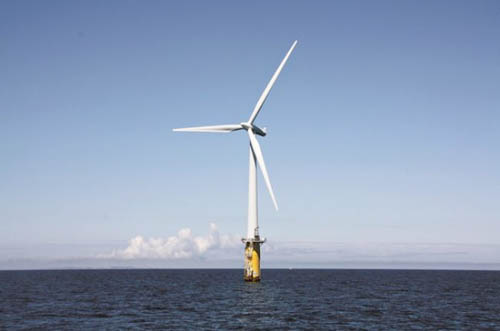 This summer has also witnessed advancements in offshore renewable energy. The first turbines for a project off the coast of Martha’s Vineyard decades in the making arrived at the end of May. Scheduled to be completed in 2024, Vineyard Wind is expected to reduce annual greenhouse gas emissions by 1.6 million tons. New Jersey also plans to develop offshore wind farms, with the goal to power about 10 million homes each year by 2040. This summer has also witnessed advancements in offshore renewable energy. The first turbines for a project off the coast of Martha’s Vineyard decades in the making arrived at the end of May. Scheduled to be completed in 2024, Vineyard Wind is expected to reduce annual greenhouse gas emissions by 1.6 million tons. New Jersey also plans to develop offshore wind farms, with the goal to power about 10 million homes each year by 2040.
With promising progress have also come significant challenges. Coastlines across the country face risks from sea level rise (SLR) and increased development; and evidence from a preliminary U.S. Geological Survey study suggests that California could lose up to 70% of its beaches by the end of this century. 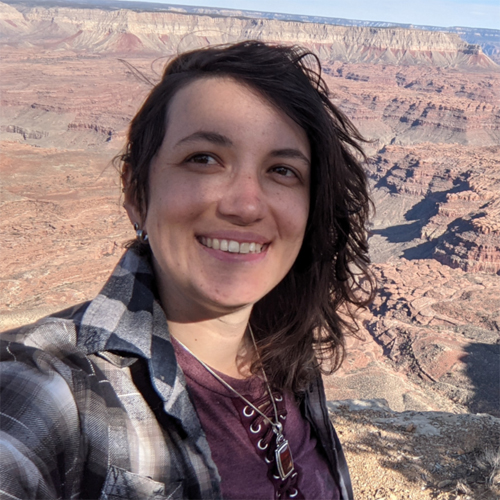 Our oceans are also under threat from plastic pollution at the hands of the world’s largest corporations. New RCC Special Correspondent Lisa Mills describes this crisis in her blog, The Weekly Warbler, which will now be a regular part of the Rachel Carson Council’s offerings on our website and in our newsletters. In this June issue, we included one of Lisa’s most penetrating essays, an examination of plastics in the ocean and why the individual consumer is not the villain. Lisa is a graduate of UNC-Asheville and writes her nature blog from Raleigh, North Carolina. And, in "Wetlands or Wastland?" I recall how I went from hating my first trip to a buggy swamp with my beloved grandmother, to worrying today about the current erosion of wetlands protection stimulated by the Supreme Court. Our oceans are also under threat from plastic pollution at the hands of the world’s largest corporations. New RCC Special Correspondent Lisa Mills describes this crisis in her blog, The Weekly Warbler, which will now be a regular part of the Rachel Carson Council’s offerings on our website and in our newsletters. In this June issue, we included one of Lisa’s most penetrating essays, an examination of plastics in the ocean and why the individual consumer is not the villain. Lisa is a graduate of UNC-Asheville and writes her nature blog from Raleigh, North Carolina. And, in "Wetlands or Wastland?" I recall how I went from hating my first trip to a buggy swamp with my beloved grandmother, to worrying today about the current erosion of wetlands protection stimulated by the Supreme Court.
As plastic pollution continues to threaten marine ecosystems and coastal communities, collaboration and advocacy are more important than ever. The effort of United Nations member countries to craft a plastic pollution reduction treaty is not without conflict. Ghanaian youth environmental advocate Betty Osei Bonsu spoke to the UN about the need to target the production of plastics, a view supported by many countries including the EU, Rwanda, and Japan, while other countries like the U.S. seek a more moderate approach. Then, be sure to check out our “Book Reviews” section where you’ll find an in-depth and discerning review essay by Bob Musil, the RCC’s own Rachel Carson expert and author. In his reading of the classic Eternal Darkness and the newly-released The Bathysphere Book, Bob reflects on how both Rachel Carson’s career and her sense of wonder is linked to the history of oceanography and was stimulated by the famous and colorful deep-sea diver, William Beebe. You’ll also find there a fresh take on how Sy Montgomery’s already classic, The Soul of an Octopus, strikes the newest generation of young environmental leaders with RCC Stanback Fellow Lucy Goldman’s review for the RCC’s summertime staff book club. Much progress has been made since the first World Oceans Day in 1992. New technological and nature-based innovations have expanded our capacity for climate change mitigation and adaptation, yet we still face many of the same challenges that plagued us over 30 years ago. As we close out Ocean Month, we need to continue our fight for healthy oceans, coastal resilience, wetlands and waterways. | | | | | | | | 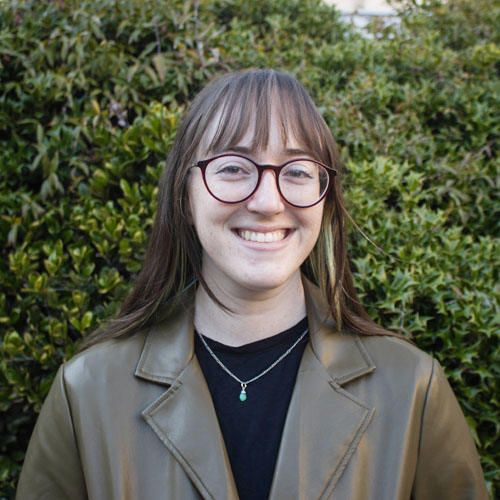 Emma Brentjens is the co-lead of the RCC Coasts and Oceans program. She is a Master of Environmental Management student at Duke University studying Ecosystem Science and Conservation and Community-based Environmental Management. Emma Brentjens is the co-lead of the RCC Coasts and Oceans program. She is a Master of Environmental Management student at Duke University studying Ecosystem Science and Conservation and Community-based Environmental Management. | | | | | | Supreme Court Won’t Review Ruling Barring Offshore Fracking in California The U.S. Supreme Court on Monday declined a request by the oil industry to review a lower court ruling barring fracking off California’s shore. In 2014, the Environmental Defense Center (EDC) sued to halt offshore fracking in federal waters off the Golden State. Four years later, Judge Philip S. Gutierrez of the Central District of California, a George W. Bush appointee, found the federal government had violated the Endangered Species Act and Coastal Zone Management Act by issuing fracking permits for the area. | | | | | | | | Biden Administration Announces $2.6 Billion Toward Coastal Climate Resilience The Commerce Department has announced it will put $2.6 billion toward coastal climate resilience in funds from the Inflation Reduction Act (IRA). The funds, announced on a Monday call with the press, will include about $400 million for tribal communities in support of habitat restoration, fish hatcheries and Pacific salmon, and those in the direct path of climate change. | | | | | | | | 70% of California’s Beaches Could Disappear by 2100, Study Finds A new study from the U.S. Geological Survey (USGS) has found that 25% to 70% of California’s beaches could disappear by the end of this century. It follows a similar study from 2017 that found 31% to 67% of beaches in Southern California were at risk. The research, which is currently undergoing the peer-review process, looks at satellite data from the past 20 years along with climate models of sea level rise. | | | | | | | | Newly Adopted UN High Seas Treaty Gives Ocean a ‘Fighting Chance’ After almost two decades of negotiations, the 193 United Nations Member States have adopted a landmark legally binding marine biodiversity treaty for the high seas beyond national boundaries, covering two thirds of Earth’s oceans, UN Secretary-General António Guterres announced yesterday during the Intergovernmental Conference on Marine Biodiversity in New York. | | | | | | | | Wetlands or Wastelands? When I was a kid growing up in northeastern North Carolina, my grandmother took my brother and me on a few hikes across the forests and wetlands of the coastal plain. She’s a gifted birder with an enviable ability to detect a species from its call. What my brother and I lacked in outdoor knowledge we made up for in complaints. I remember us traveling in her bright red Toyota Echo, drinking from hot water bottles, and dreaming of air conditioning and ice cream and whatever else awaited us after our excursions. Still, my grandmother was determined to show us the wonders of nature. | | | | | | | | Oyster Shells Dumped Into Turtle Bay to Improve Water Quality There’s a clean-up underway on one of our waterways, but to some, it might look like trash is getting dumped there. Actually, these are recycled oyster shells, and they are helping improve water quality. “And this oyster shell, as it sits in the water column, will attract baby oysters,” said Adam Miller, CEO of the Coastal Conservation Association of Florida. “They get stuck in those grooves and holes, and that’s essentially how we create a new oyster reef.” He calls it a plus for the water and oysters. | | | | | | | | Georgia Marshlands Guard Us During Hurricanes, Now They Need Guarding Themselves The Georgia coast is home to over 380,000 acres of salt marsh. That's a quarter of all salt marshes on the east coast. It's a jewel of our coastline. Not only brilliant to look at, salt marshland is home to thousands of aquatic species, including oysters and fish. It is also what's known as 'blue carbon,' water that's able to sequester and store carbon. In fact, our marshland can do this at a rate 10 times that of a mature tropical forest. | | | | | | | | Restoring Seabird Populations Can Help Repair the Climate Seabirds evolved about 60 million years ago, as Earth’s continents drifted toward their current positions and modern oceans took shape. They spread across thousands of undisturbed islands in the widening seas. They distribute nutrients, in the form of guano, that’s beneficial to plankton, seagrass and coral reefs, which, in turn, nurtures fish populations that are eaten by seabirds and marine mammals in a cycle that forms a biological carbon pump. | | | | | | | | Offshore Wind Arrives in America Rachel Pachter has been waiting for a boat like the Felicity for more than 20 years. As the 490-foot vessel sailed toward the harbor here Wednesday, she reflected on those decades: clipping newspaper articles as an intern for the mythical Cape Wind project in the early 2000s; the January night in 2015 when that offshore wind dream died; the empty dock space that was built to receive its parts, but only attracted seagulls and angry newspaper headlines. | | | | | | | | Offshore Wind Buildout Helps Environmental Justice With Training, Jobs and Health Outcomes For Communities Left Behind, Say 125 Elected Officials Elected Officials to Protect America (EOPA) New Jersey, a non-profit group of elected officials who are working to solve the climate crisis, held a virtual press conference on May 30, 2023 on the progress of offshore wind development in New Jersey. | | | | | | | | Underwater Robot Deployed to Aid Endangered Right Whales With spring well underway, the North Atlantic right whales that migrated to Georgia to give birth here over the winter have migrated back north to their feeding grounds off New England and Canada. Researchers know from aerial surveys that at least 16 calves were born in the 2022-23 season. But scientists don’t just look for whales, they listen for them, too. And this year they added an underwater robot to the listening platforms in Georgia. | | | | | | | | On the Eve of Plastics Treaty Talks, a Youth Advocate From Ghana Speaks Out: ‘We Need Urgent Action’ United Nations delegates gathering for a second negotiating session stake out their positions as environmental groups, businesses and scientists seek to influence the outcome of plastic treaty talks. The youngest voice on a Paris stage Friday had an especially compelling call for the world to act quickly and decisively to end the global plastics crisis. | | | | | | | | Opinion: UN Plastics Treaty Should Prioritize Health and Climate Change As parties to the United Nations Environment Assembly gather this week in Paris to negotiate a first-ever Global Plastic Treaty, they have a once-in-a-generation opportunity to prevent public heath crises and mitigate climate change. Countries should negotiate a rights-respecting treaty that fully encompasses the impacts of plastic production, use and disposal on human health and the environment. | | | | | | | | Your Plastic Straw Isn’t Killing Sea Turtles – Corporations Are I think we’ve all heard this one before: “You know your plastic straw is killing all the sea turtles, right?” I have never liked this sentiment, mainly because it puts the blame on the individual for such a huge issue that often we have no control over. Let’s get one thing straight: Consumers did not create the plastic pollution problem. Corporations did. | | | | | | | | | | Louisiana Reef Program Working to Restore Fish Habits in Sportsman’s Paradise As Louisiana continues to take the lead in coastal restoration, a new underwater project is in the works. The Coastal Conservation Association of Louisiana (CCA), the Louisiana Department of Wildlife and Fisheries, Danos, and White Water Contractors Inc. have started construction on a new program that will place 128 fish house modules in the South Marsh Island 235 artificial reef. | | | | | | | | National Fish Habitat Partnership Projects to Engage Recreational Fishing Communities and Restore Habitat Nearly $180,000 will support habitat restoration and angler engagement in Florida, Hawaiʻi, and Alaska. NOAA Fisheries is funding four projects in 2023 to restore habitat through the coastal National Fish Habitat Partnerships. These projects will actively engage local communities, including anglers, who make critical contributions to fish habitat conservation nationwide. | | | | | | | | Rachel Carson, William Beebe and Ocean Exploration Robert D. Ballard with Will Hively, The Eternal Darkness: A Personal History of Deep-Sea Exploration (Princeton Science Library) Brad Fox, The Bathysphere Book: Effects of the Luminous Ocean Depths (Astra House)  On July 19, 1949, Rachel Carson donned an 84-pound classic copper diving helmet to descend into the stormy waters of Biscayne Bay in Florida. Carson joined, if briefly, the long history of ocean exploration, especially the deep sea that had fascinated humans since earliest recorded history. Carson was doing research for her massive best-seller, The Sea Around Us (1951), that garnered awards, fame, and sufficient funds for her to leave government service and devote her time to writing. On July 19, 1949, Rachel Carson donned an 84-pound classic copper diving helmet to descend into the stormy waters of Biscayne Bay in Florida. Carson joined, if briefly, the long history of ocean exploration, especially the deep sea that had fascinated humans since earliest recorded history. Carson was doing research for her massive best-seller, The Sea Around Us (1951), that garnered awards, fame, and sufficient funds for her to leave government service and devote her time to writing.
Her writing, of course, led to Silent Spring and the birth of the modern environmental movement. But it was a once famous, colorful ornithologist, explorer, and pioneering deep ocean diver named William Beebe who helped launch Carson’s career.
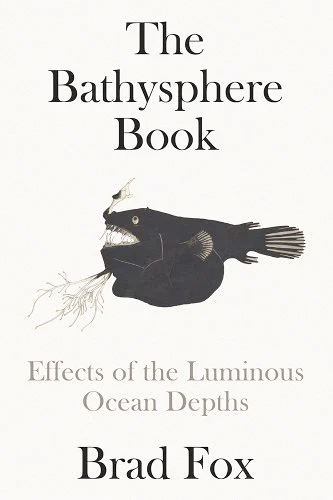 Beebe was shown Carson’s first published nature piece, “Undersea,” by the editors at Atlantic and was deeply impressed. Carson sought a meeting with him in 1938 and hoped Beebe could arrange a dive off Bermuda to experience the sea first-hand. Diving would have to wait, but when Carson expanded the essay into her first book, Under the Sea-Wind (1941), Beebe praised it in the Saturday Review and then included a section from the book in his compendium of famous nature authors, The Book of Naturalists (1945). Carson was the first and only woman to be included. Beebe and Carson became friends; she frequently sought his advice and continued to hope to arrange a deep sea dive. Beebe was shown Carson’s first published nature piece, “Undersea,” by the editors at Atlantic and was deeply impressed. Carson sought a meeting with him in 1938 and hoped Beebe could arrange a dive off Bermuda to experience the sea first-hand. Diving would have to wait, but when Carson expanded the essay into her first book, Under the Sea-Wind (1941), Beebe praised it in the Saturday Review and then included a section from the book in his compendium of famous nature authors, The Book of Naturalists (1945). Carson was the first and only woman to be included. Beebe and Carson became friends; she frequently sought his advice and continued to hope to arrange a deep sea dive.
In her research in the 1930s for Under the Sea-Wind, Carson had read deeply and thoroughly in the history of oceanographic research, including the findings of the H.M.S Challenger whose 1875 voyage to take soundings and collect species began our understanding of the depth of the ocean and the denizens of the deep. She also studied The Depths of the Ocean (1912) by Sir John Murray and Johan Hjort, the most comprehensive oceanography reference of the time that offered a detailed history of ocean exploration and the astounding findings of the Michael Sars, a ship lent to Murray by the Norwegian government. It was filled with illustrations of marine species of all kinds, but they were lifeless and black-and-white. And, of course, Carson was familiar with Beebe’s early, shallow dives in his homemade helmets and the familiar diving helmet like the one she would use. Read more and purchase | | | | | | Octopus Love The Soul of an Octopus: A Surprising Exploration into the Wonder of Consciousness by Sy Montgomery T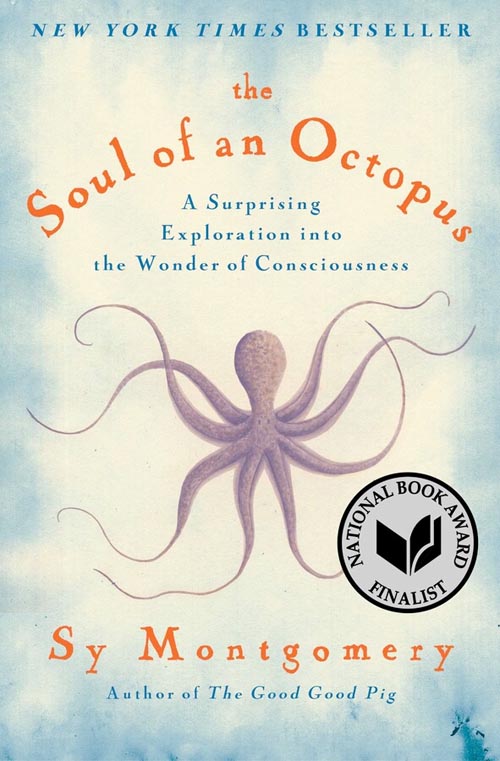 he Soul of an Octopus by Sy Montgomery is a riveting account of one naturalist’s deep dive into the world of the octopus. Montgomery explores octopus consciousness through developing intimate relationships with several octopuses at the New England Aquarium. She takes readers along to her weekly visits behind the scenes of the octopus exhibit, as she develops trust, recognition, and genuine connection with these intelligent invertebrates. he Soul of an Octopus by Sy Montgomery is a riveting account of one naturalist’s deep dive into the world of the octopus. Montgomery explores octopus consciousness through developing intimate relationships with several octopuses at the New England Aquarium. She takes readers along to her weekly visits behind the scenes of the octopus exhibit, as she develops trust, recognition, and genuine connection with these intelligent invertebrates.
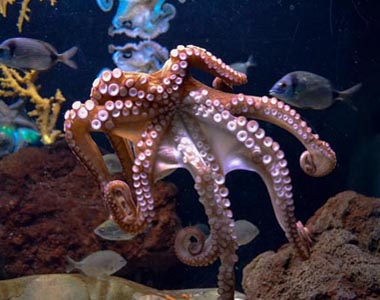 Montgomery also describes her mesmerizing encounters with octopuses, both captive and wild, from New England to Seattle, the Caribbean, French Polynesia, and beyond. Along the way, Montgomery’s connection to the octopus enhances her fascination with the ocean and deepens her reverence for the natural world. She recounts thrilling stories from her explorations of aquatic species demonstrating emotions and tendencies once thought to be uniquely human. Montgomery also describes her mesmerizing encounters with octopuses, both captive and wild, from New England to Seattle, the Caribbean, French Polynesia, and beyond. Along the way, Montgomery’s connection to the octopus enhances her fascination with the ocean and deepens her reverence for the natural world. She recounts thrilling stories from her explorations of aquatic species demonstrating emotions and tendencies once thought to be uniquely human.
Montgomery observes, for instance, how octopuses even have the ability to bring people together. She explains that caring for octopuses at the New England Aquarium allowed her to foster lifelong bonds with the aquarium staff and volunteers. She speaks often of her powerful connection with the other octopus caretakers, formed through a shared love and respect for this incredible creature. She also wonders at the ability of the octopus to temporarily alleviate human suffering and to provide an escape from reality for those who need it most. Montgomery and her fellow octopus lovers also wrestle with the concept of captivity and the moral ground for taking an animal from the wild to place it on display. They contend that the octopus, and other species, held in captivity serve as stewards for the rest of their kind. Aquariums and other such humane enclosures allow a much larger segment of the population to wonder at the marvels of the ocean and environment. It is not solely scientists who deserve to experience how a creature so different from us can act in ways strikingly similar. Our attachment to these animals heightens our commitment to their conservation. As such, exposing as many people as possible to the beauty of the natural world is of the utmost importance to sustaining it. Montgomery does an excellent job of this in The Soul of an Octopus, making this National Book Award winner essential reading. RCC Stanback Climate Justice Fellow – Lucy Goldman Lucy Goldman is a rising junior at Duke University studying Public Policy and Computer Science. | | | |  The Rachel Carson Council Depends on Tax-deductible Gifts From Concerned Individuals Like You. Please Help If You Can. The Rachel Carson Council Depends on Tax-deductible Gifts From Concerned Individuals Like You. Please Help If You Can. | | | | | | | |  Sign Up Here to Receive the RCC E-News and Other RCC Newsletters, Information and Alerts. Sign Up Here to Receive the RCC E-News and Other RCC Newsletters, Information and Alerts. | | | | | | | | | | | |